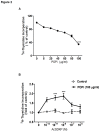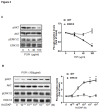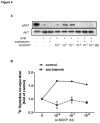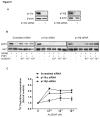AcSDKP regulates cell proliferation through the PI3KCA/Akt signaling pathway
- PMID: 24244481
- PMCID: PMC3820705
- DOI: 10.1371/journal.pone.0079321
AcSDKP regulates cell proliferation through the PI3KCA/Akt signaling pathway
Abstract
The natural tetrapeptide acetyl-N-Ser-Asp-Lys-Pro (AcSDKP) is generated from the N-terminus of thymosin-β4 through enzymatic cleavage by prolyl oligopeptidase (POP). AcSDKP regulation of proliferation of different cells is implicated in hematopoiesis and angiogenesis. This tetrapeptide present in almost all cells was recently detected at elevated concentrations in neoplastic diseases. However, previously reported in vitro and in vivo studies indicate that AcSDKP does not contribute to the pathogenesis of cancers. Here we show that exogenous AcSDKP exerts no effect on the proliferation of actively dividing malignant cells. Using S17092, a specific POP inhibitor (POPi), to suppress the biosynthesis of AcSDKP in U87-MG glioblastoma cells characterized by high intracellular levels of this peptide, we found that all tested doses of POPi resulted in an equally effective depletion of AcSDKP, which was not correlated with the dose-dependent decreases in the proliferation rate of treated cells. Interestingly, addition of exogenous AcSDKP markedly reversed the reduction in the proliferation of U87-MG cells treated with the highest dose of POPi, and this effect was associated with activation of the phosphatidylinositol-3 kinase (PI3K)/Akt pathway. However, extracellular-regulated protein kinase (ERK) activation was unaltered by S17092 and AcSDKP co-treatment. Knockdown of individual PI3K catalytic subunits revealed that p110α and p110β contributed differently to AcSDKP regulation of U87-MG cell proliferation. Disruption of p110α expression by small interfering RNA (siRNA) abrogated AcSDKP-stimulated Akt phosphorylation, whereas knockdown of p110β expression exhibited no such effect. Our findings indicate for the first time that the PI3KCA/Akt pathway mediates AcSDKP regulation of cell proliferation and suggest a role for this ubiquitous intracellular peptide in cell survival.
Conflict of interest statement
Figures





References
-
- Kanasaki K, Haneda M, Sugimoto T, Shibuya K, Isono M et al. (2006) N-acetyl-seryl-aspartyl-lysyl-proline inhibits DNA synthesis in human mesangial cells via up-regulation of cell cycle modulators. Biochem Biophys Res Commun 342: 758-765. doi:10.1016/j.bbrc.2006.02.019. PubMed: 16497271. - DOI - PubMed
Publication types
MeSH terms
Substances
LinkOut - more resources
Full Text Sources
Other Literature Sources
Molecular Biology Databases
Miscellaneous

